The Intel 9th Gen Review: Core i9-9900K, Core i7-9700K and Core i5-9600K Tested
by Ian Cutress on October 19, 2018 9:00 AM EST- Posted in
- CPUs
- Intel
- Coffee Lake
- 14++
- Core 9th Gen
- Core-S
- i9-9900K
- i7-9700K
- i5-9600K
CPU Performance: Office Tests
The Office test suite is designed to focus around more industry standard tests that focus on office workflows, system meetings, some synthetics, but we also bundle compiler performance in with this section. For users that have to evaluate hardware in general, these are usually the benchmarks that most consider.
All of our benchmark results can also be found in our benchmark engine, Bench.
PCMark 10: Industry Standard System Profiler
Futuremark, now known as UL, has developed benchmarks that have become industry standards for around two decades. The latest complete system test suite is PCMark 10, upgrading over PCMark 8 with updated tests and more OpenCL invested into use cases such as video streaming.
PCMark splits its scores into about 14 different areas, including application startup, web, spreadsheets, photo editing, rendering, video conferencing, and physics. We post all of these numbers in our benchmark database, Bench, however the key metric for the review is the overall score.
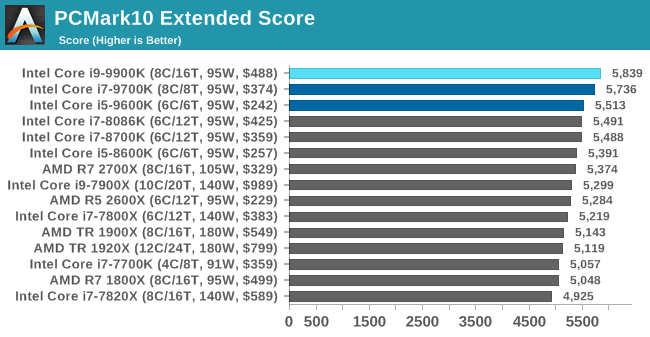
As a general mix of a lot of tests, the new processors from Intel take the top three spots, in order. Even the i5-9600K goes ahead of the i7-8086K.
Chromium Compile: Windows VC++ Compile of Chrome 56
A large number of AnandTech readers are software engineers, looking at how the hardware they use performs. While compiling a Linux kernel is ‘standard’ for the reviewers who often compile, our test is a little more varied – we are using the windows instructions to compile Chrome, specifically a Chrome 56 build from March 2017, as that was when we built the test. Google quite handily gives instructions on how to compile with Windows, along with a 400k file download for the repo.
In our test, using Google’s instructions, we use the MSVC compiler and ninja developer tools to manage the compile. As you may expect, the benchmark is variably threaded, with a mix of DRAM requirements that benefit from faster caches. Data procured in our test is the time taken for the compile, which we convert into compiles per day.
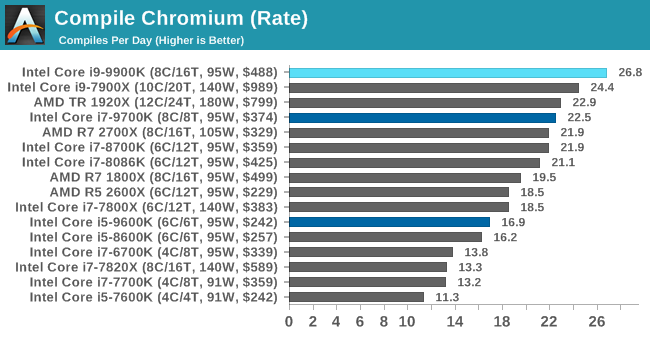
Pushing the raw frequency of the all-core turbo seems to work well in our compile test.
3DMark Physics: In-Game Physics Compute
Alongside PCMark is 3DMark, Futuremark’s (UL’s) gaming test suite. Each gaming tests consists of one or two GPU heavy scenes, along with a physics test that is indicative of when the test was written and the platform it is aimed at. The main overriding tests, in order of complexity, are Ice Storm, Cloud Gate, Sky Diver, Fire Strike, and Time Spy.
Some of the subtests offer variants, such as Ice Storm Unlimited, which is aimed at mobile platforms with an off-screen rendering, or Fire Strike Ultra which is aimed at high-end 4K systems with lots of the added features turned on. Time Spy also currently has an AVX-512 mode (which we may be using in the future).
For our tests, we report in Bench the results from every physics test, but for the sake of the review we keep it to the most demanding of each scene: Ice Storm Unlimited, Cloud Gate, Sky Diver, Fire Strike Ultra, and Time Spy.
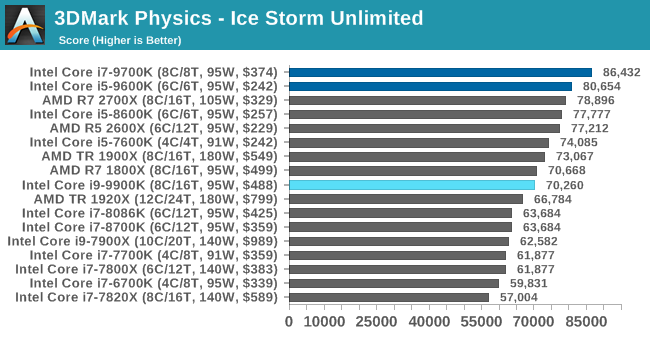
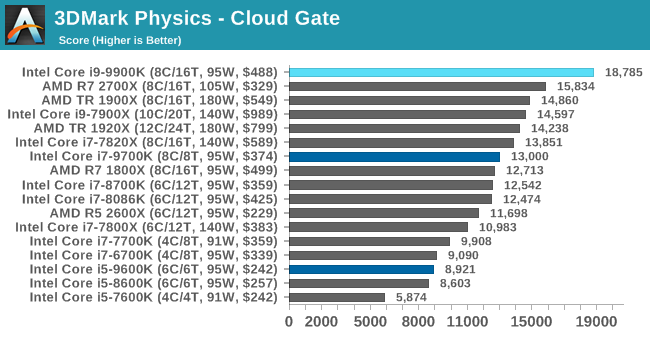
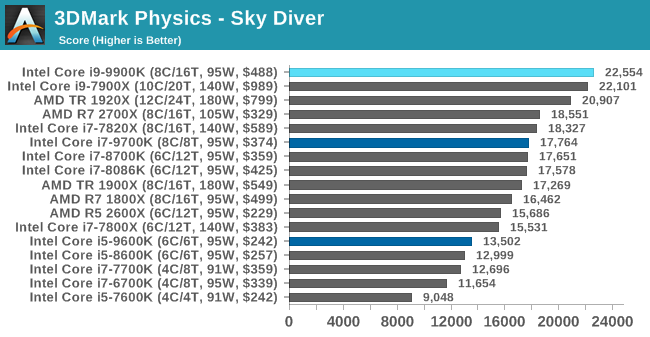
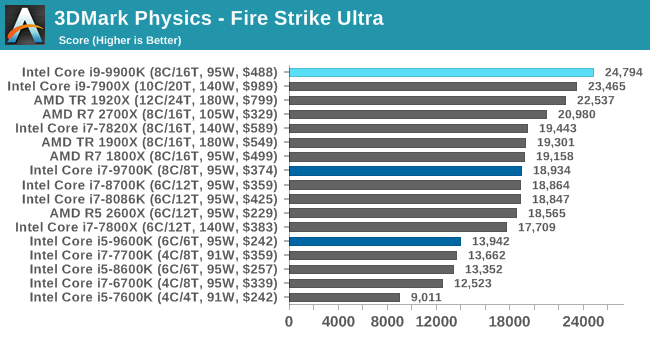
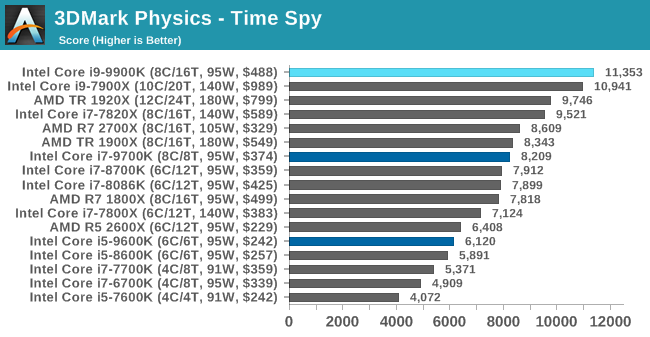
The older Ice Storm test didn't much like the Core i9-9900K, pushing it back behind the R7 1800X. For the more modern tests focused on PCs, the 9900K wins out. The lack of HT is hurting the other two parts.
GeekBench4: Synthetics
A common tool for cross-platform testing between mobile, PC, and Mac, GeekBench 4 is an ultimate exercise in synthetic testing across a range of algorithms looking for peak throughput. Tests include encryption, compression, fast Fourier transform, memory operations, n-body physics, matrix operations, histogram manipulation, and HTML parsing.
I’m including this test due to popular demand, although the results do come across as overly synthetic, and a lot of users often put a lot of weight behind the test due to the fact that it is compiled across different platforms (although with different compilers).
We record the main subtest scores (Crypto, Integer, Floating Point, Memory) in our benchmark database, but for the review we post the overall single and multi-threaded results.
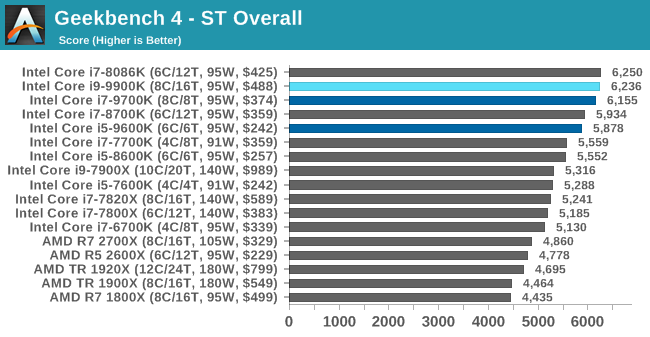
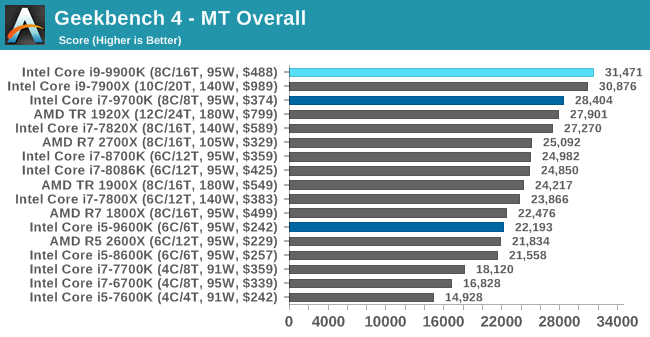










274 Comments
View All Comments
0ldman79 - Friday, October 19, 2018 - link
There are certainly occasions where more cores are better than clock speed.Just look at certain mining apps. You can drop the power usage by half and only lose a little processing speed, but drop them to 2 cores at full power instead of 4 and it is a *huge* drop. Been playing with the CPU max speed in Windows power management on my various laptops. The Skylake i5 6300HQ can go down to some seriously low power levels if you play with it a bit. The recent Windows updates have lost a lot of the Intel Dynamic Thermal control though. That's a shame.
Makaveli - Friday, October 19, 2018 - link
Power consumption rules on mobiles parts why would they release an 8 core model?notashill - Friday, October 19, 2018 - link
Because you get more performance at the same power level using more cores at lower clocks. The additional cores are power gated when not in use.evernessince - Saturday, October 20, 2018 - link
Not judging by the power consumption and heat output displayed here.mkaibear - Friday, October 19, 2018 - link
9700K is definitely the way to go on the non-HEDT. 9900K is technically impressive but the heat? Gosh.It's definitely made me consider waiting for the 9800X though - if the 7820X full load power is 145W ("TDP" 140W) at 3.6/4.3, then the 9800X isn't likely to be too much higher than that at 3.8/4.5.
Hrm.
Cooe - Friday, October 19, 2018 - link
"9700K is definitely the way to go on the non-HEDT."I think you meant to say "Ryzen 5 2600 unless your GPU's so fast, it'll HEAVILY CPU-bind you in gaming" but spelt it wrong ;). The 9700K is a vey good CPU, no doubt, but to claim it the undisputed mainstream champ at it's currently mediocre bang/$ value (so important for the mainstream market) doesn't make any sense, or accurately represent what people in the mainstream are ACTUALLY buying (lots of Ryzen 5 2600's & i5-8400's; both with a MUCH saner claim to the "best overall mainstream CPU" title).
mkaibear - Saturday, October 20, 2018 - link
No, I meant to say "9700K is definitely the way to go on the non-HEDT".Don't put words in people's mouth. I don't just game. The video encoding tests in particular are telling - I can get almost a third better performance with the 9700K than I can the r5 2600x.
>"best overall mainstream CPU" title
Please don't straw man either. Nowhere did I say that it was the best overall mainstream CPU (that's the R7 2700X in my opinion), but for my particular use case the 9700K or the 9800X are better suited at present.
koaschten - Friday, October 19, 2018 - link
Uhm yeah... so where are the 9900k overclocking results the article claims are currently being uploaded? :)watzupken - Friday, October 19, 2018 - link
The i9 processor is expected to be quite impressive in performance. However this review also reveals that Intel is struggling to pull more tricks out of their current 14nm and Skylake architect. The lack of IPC improvement over the last few generations is just forcing them to up the clockspeed to continue to cling on to their edge. Considering that they are launching the new series this late in the year, they are at risk of AMD springing a surprise with their 7nm Zen 2 slated to launch next year.SquarePeg - Friday, October 19, 2018 - link
If the rumored 13% IPC and minimum 500mhz uplift are for real with Zen 2 then AMD would take the performance crown. I'm not expecting very high clocks from Intel's relaxed 10nm process so it remains to be seen what kind of IPC gain they can pull with Ice Lake. It wouldn't surprise me if they had a mild performance regression because of how long they had to optimize 14nm for clock speed. Either way I'm all in on a new Ryzen 3 build next year.